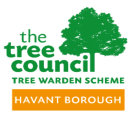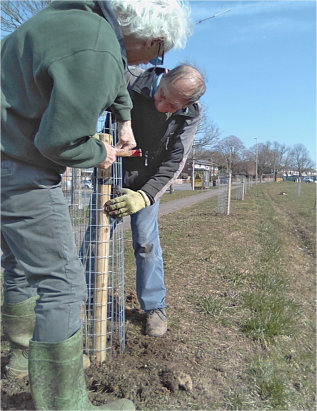
Supplied by Hampshire Forest Partnership and planted at Bartons Road in Havant by volunteers from Havant Borough Tree Wardens, St Alban’s Church and HBC councillors.
Large Elms used to be a common sight in Hampshire until they were devastated by Dutch elm disease between the late 1960s and early 1980s. These disease-resistant Elms are specially bred to withstand Dutch elm disease and are part of a Hampshire-wide trial.
Elm flower buds are the sole food plant for caterpillars of the white-letter hairstreak butterfly which gets its name from the letter "W" that is formed from a series of white lines found on the underside of the hindwings. This species suffered as a result of Dutch elm disease, especially in southern sites, to the extent that there was concern it might become extinct in the British Isles.

Dutch elm disease (DED) is spread by elm bark beetles. Evidence suggests the DED pathogen Ophiostoma ulmi could be endemic to Japan. DED caused by O ulmi was first observed in north-west Europe about 1910. Although it is believed to be of Asian origin, the disease got its name from the team of Dutch pathologists who carried out research on it in the 1920s.
After causing losses of between 10% and 40% in a number of European countries, this first epidemic had died down by the 1940s, probably because the fungus was susceptible to viruses.
A second and much more destructive outbreak of the disease began in the late 1960s, caused by a different and much more aggressive fungus O novo-ulmi introduced into the UK on infected elm logs imported from Canada.
The new epidemic took rapid hold, especially of English elm trees in lowland regions of central and southern Britain during the early to mid-1970s, leading to the deaths of most of our mature English elms by the early 1980s.
Havant Borough Tree Wardens lead tree walks and encourage people to appreciate trees and look after them.
We welcome new volunteers to enable us to continue our work. You do not need to know anything about trees or have experience of conservation work. If you would like to know more, please contact us at: hbctreewardens@gmail.com